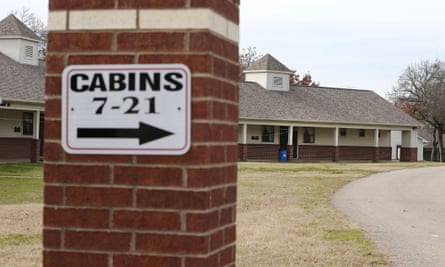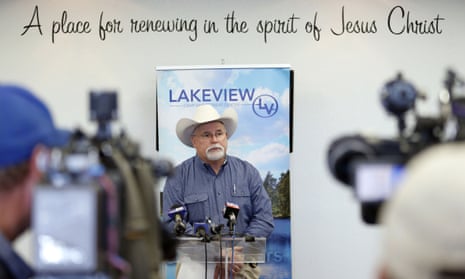As a wave of Central American children are crossing the US border alone fleeing violence and poverty in their countries, new facilities to house these children are popping up with just a few days’ notice in southern border towns.
In Rockwall, Texas, hundreds of children arrived Saturday to a hot spaghetti meal. Residents in the town north-east of Dallas may not welcome the federal government’s last-minute announcement that they will place a facility in their town, but they are receiving the displaced children as warmly, and quickly, as they can.
“A lady called me from Ohio and chewed me up, called me treasonous, everything,” said Eddie Walker, who owns the Sabine Creek ranch camp, where hundreds of children arrived Saturday. “But locally the response has been almost all positive. People want to help.”
In October and November, more than 10,000 unaccompanied minors crossed the border through Mexico, more than twice as many as the same months last year. As a result US detention centers have overflowed, and the government is building temporary shelters.
Towns selected for shelters in Texas and California are finding out sometimes a couple days in advance, and residents are scrambling to understand what impact the centers will have. “I just got called to a meeting where the federal government told us what they were going to do,” said David Sweet, a judge in Rockwall. “They said, ‘We are going to build this in your backyard.’”
At first, Walker said, federal authorities declined any outside interference. “These kids are in, you know – basically prison,” Walker said. But at the last moment the United States bowed to the good will of the people of Rockwall and decided to allow Christmas gifts.
“We just found out two days ago. We are excited,” said Anna Holland, who is coordinating gift collection at Lakeshore Church. One local business is donating hair accessories for all the girls at the ranch, she said. And she read off a list of other items she’s collecting – pajamas, soccer balls, knit caps. “I don’t know what the government is going to do with these kids,” Holland said. “But they’re here now. So we are going to do what we can.”
Experts say the children are largely driven by violence in the so-called Northern Triangle – El Salvador, Guatemala and Honduras – and have more in common with refugees fleeing war than with immigrant workers. Each of those countries suffered civil wars during the 1980s, and never recovered from the legacy of violence; they now make up the most homicidal region in the world. Children – mostly boys – are often targeted for forced gang initiation.

Once they’re apprehended in the United States, Border Patrol has 72 hours to hand them over to the department of Health and Human Services, where the Office of Refugee Resettlement tries to locate any contacts the children may have in the United States, or they await an immigration hearing. During that time they’ll live at a US shelter, often for up to a month. Due to the recent surge the government is opening at least two shelters in Texas and one in California.
“We need to change the laws here to reflect the change in circumstances,” said Maureen Meyer, an analyst at the Washington Office on Latin America. “These are people being persecuted by violence in their home countries, and they’re fleeing it.”
Previously, she said, most unaccompanied minors entered the country with the aim of meeting a parent or guardian somewhere in the United States. But new research across the border in Mexico, she said, shows that now the children are largely being sent on their own, figuring that any place in the US is safer than where they grew up.
“These kids have been traumatized, and have already seen violence,” Meyer said. Some of them, she said, left a hospital in Central America and kept walking north until they were picked up by US Border Patrol agents.
“Sure, it’s risky to try to make the journey,” Meyer said. “But the choice they’re making is whether to go, or risk dying the next day if they stay where they are.”
The children present a complex situation to the towns where they land. They don’t worry that they are terrorists or murderers or drug kingpins. But that doesn’t make it easy to accept them in overwhelming numbers, according to Sweet, the Rockwall county judge. He’s the highest elected official in the county, in a state where the government of the United States has never been viewed as an agreeable guest.
He blames the United States to some degree, he said. “It makes me so sad these kids have had to endure this,” he said. “But the same thing happened last year. And what did the [federal] administration change? Nothing. They changed nothing. So it has happened again.”
On Saturday night the children ate their first meal at the Sabine Creek dining hall. Eddie Walker moved through the dining hall, looking into the faces of the children, and thought of a passage from the Gospel of Matthew. “I thought about the section where Jesus describes the sheep and the goats,” he said.
In the parable, Jesus tells the former: “I was hungry and you gave me food, I was thirsty and you gave me drink, I was a stranger and you welcomed me, I was naked and you clothed me, I was sick and you visited me, I was in prison and you came to me.”
That’s what Walker had in mind as he watched the children eat. He’d rather be a sheep than a goat.
Caring for the children isn’t like running the summer camp he normally oversees, he said. It’s hard to find staffers willing to work over Christmas and New Year’s Day. Hard to prepare three meals a day for the children, and another at 2am for the enormous security detail. The federal government has stringent requirements about who can enter the ranch, who can interact with the children, what they can bring with them. Walker realized in that moment that he had become, temporarily, a prison warden.
The children didn’t smile. They just ate. “But they knew they were safe, and had a warm meal, and a place to sleep,” he said. “I can live with that.”

Comments (…)
Sign in or create your Guardian account to join the discussion